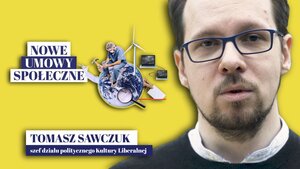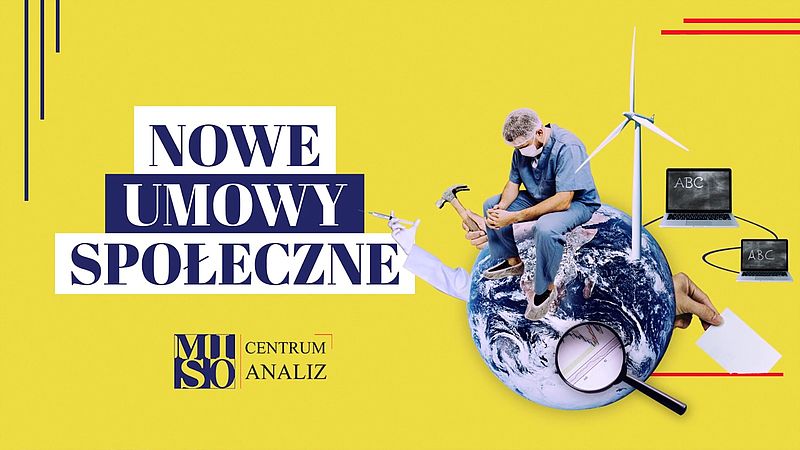Speakers’ Corner – New Social Contracts
On June 19, 2021, as part of the Speakers' Corner series of talks and articles organized by the MISO Analysis Center, we discussed new social contracts.
As part of the "New Social Contracts" topic, there was a discussion between Konrad Ciesiołkiewicz and Sławomir Nitras under the title Between Monologue and Dialogue. Then we could listen to Tomasz Sawczuk's speech titled What kind of order?
At Poland of the Future Campus organized by Rafał Trzaskowski, the topic of dialogue was one of the themes of the meeting with young people. Konrad Ciesiołkiewicz asked Sławomir Nitras what thought was behind that.
- I do not treat it as a theme, but as a method. At Campus Poland of the Future we want to talk about everything - about the most difficult problems in Poland. And we want to talk about them in an atmosphere of dialogue, which the young lack, for example, at school. I am a man who is decisive in life and expressive as a politician. This does not always serve well. But I am aware that in the end one has to reach an agreement - which politicians often do reach, but they do not show it, hence the culture of dialogue has never been good - Nitras said.
- Did anyone at school have lessons on how to have a dialogue and bring about an agreement? Disagreement is natural in a society, but how to get out of it? Even as parents we have a dialogue with our children. That is why it is so important – the Polish MP added.
According to Konrad Ciesiołkiewicz, we witness an intergenerational polarization. Many politicians support this pattern of the conflict, i.e. the young support certain circles, while the older not any longer. How to bring us to live peacefully in Poland, to learn from one another?
According to Sławomir Nitras, the biggest conflict is the political one. It is not of a purely partisan nature, but more of a cultural-civilizational one, concerning the way of life, the idea of the world. Modernist vs. conservative. And hence, this fits into the intergenerational conflict. What's more, in Poland politicians count more with the elderly, because they are voters to a greater extent. In the West, civic education is taken seriously, in our country WOS (the Civics), unfortunately, is not. And yet living in society is one of the basic roles.
The social dialogue meeting the needs of modern times is close to the idea of a new social deal. On what elements, then, is it worth building such an agreement so that the young accept it?
- Certainly, the school is a hugely important element. The young people have less influence on school than I and my peers did have. Today, the school is the domain of the minister, maybe some teachers. And school children have no say. The second element is the job market, where the young are undervalued. They often do harder work, give a lot of themselves, but they are told that they will only get an allowance in 20 years. And who has settled this with whom? The young are not in this discussion - Nitras said.
We invite you to watch a discussion between Sławomir Nitras and Konrad Ciesiołkiewicz titled Between Monologue and Dialogue.

_ _ _ _ _
In the U.S., Europe and Poland there is a lot of talk about projects for a new order, a new beginning. On top of that, everyone wants to be communal, write programs and present demands at public meetings. Does this make sense and where does it come from? And what is the future of centrist politics in Poland?
According to Tomasz Sawczuk, we have a crisis of liberal democracy and a crisis of the health situation. Immediately, the idea arises that in order to cope with with the crisis one must propose a new order and look for a new community. The question arises, what kind of order it should be. Will it be better?
It is enough to separate justice from injustice. In this way, liberal democrats can forcefully defend what is just in the hitherto political order and attack injustices at the same time. If we think about the idea of a new order, we must take seriously the maxim that there is no going back to the past. We can only seek a way forward and build only new coalitions. We are living in times in which important social transformations are taking place. Our choice is whether we will want to co-shape this future or just passively watch it.
Secondly, the community. To build a new majority, we need to look for a concept that is inclusive, not based on exclusion and contempt. Therefore, let us adopt the principle of respect instead of contempt and some social imagination. We need to look beyond the tip of our own nose and consider whether what we say is equally true for people who are young, for example, and for those who are older.
That brings us to the third point - universalism. We need to form policies that aim at including the largest possible group of Poles. Then we will create a political system that will have the lasting support of the majority.
In his book "New Liberalism," Tomasz Sawczuk writes about three principles for the future of Polish centrist politics.
First, renew democracy. Poland's democratization process is not complete. There is still a large group of people on the liberal side who have a problem expressing elementary respect for those in need of social and social policy support. This is a big mistake.
Second, reject conservatism. Liberal democracy needs its own moral basis. This kind of democracy will be a friend of both religious and non-religious people. The point is to choose a different foundation for agreement.
Centrist politics should abandon free-market dogmatism in favor of a completely pragmatic approach to economic issues. When liberals focus too much on economic freedom, they act as if they are blind in one eye.
Great changes in civilization have always involved the end of some status quo. None of these moments created the ultimate form of liberal democracy, because it doesn't have it. It is an ongoing political experiment. That's why it's worth talking about new orders.
The question whether we are able to cope with injustice is a factor in connection with which the people support the political order and it is also a way of gaining legitimization for the political system. Maintaining, nurturing legitimate institutions, as well as identifying and responding to new emerging injustices, this is always a task for the future. There is nothing to be afraid of, we need to experiment a little.
We invite you to see Tomasz Sawczuk's article titled What kind of order?

_ _ _ _ _
Konrad Ciesiołkiewicz - psychologist, political scientist and manager. Chairman of the Social Dialogue Committee of the Polish Chamber of Commerce. President of the Orange Foundation. Member of the WIĘŹ Laboratory Team. He worked in NGOs, consulting agencies and in the government.
Sławomir Nitras - Member of Parliament of the Republic of Poland, graduate of political science at the Faculty of Humanities of the University of Szczecin.
Tomasz Sawczuk - head of the political section of the magazineU"Kultura Liberalna", doctor of philosophy and lawyer, author of the book "New Liberalism. How to understand and Exploit the Crisis of the Third Republic of Poland".


